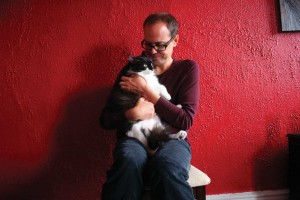Trap-Neuter-Return reduces feral feline population

Some feral cats can be domesticated, like Ossington Avenue resident James Beaton’s cat Boo. Courtesy Barbara Isherwood
By Summer Reid
The City of Toronto has begun funding a program aimed at controlling its growing feral cat population. Under the Trap-Neuter-Return program, feral cats are trapped and brought to a veterinary clinic, where they are spayed or neutered and treated for any diseases, after which the cats are returned to the area in which they were found.
“We use the same kind of trap you would use to trap a raccoon,” explains Barbara Isherwood, a local volunteer from Annex Cat Rescue, which has been rescuing cats since 1997. “It’s a wild animal trap. It has a sensitive plate and once the cat walks in, attracted by food, when it gets to a certain point there’s a mechanism that shuts the door behind it.”
There are estimated to be anywhere from 20,000 to 50,000 feral felines roaming the city, using yards as litter boxes, picking fights with house cats, and creating a harsh smell by spraying.
“The bottom line is there’s a lot of them and they become an issue when people complain,” says Dr. Esther Attard, a veterinarian with Toronto Animal Service.?She added that living out on the streets isn’t good for the cats themselves.
These are not stray cats or cats that have been lost or left outside accidentally. Strays may become feral over time, but under the right circumstances they can be reintroduced back into a domestic environment.
Feral cats are a different animal altogether. A feral cat has never been socialized, because it has never had any contact with humans or its contact with humans has decreased drastically over time, explains Joanna Reading, chair of Annex Cat Rescue. Most feral cats do not like to be inside and are unlikely to become lap cats.
Isherwood is currently caring for an eight-year-old with an injured leg that was recently trapped. The veterinarian didn’t think the older feral cat — they have an average lifespan of about three years — would make it through the winter.
“She’s in my front room; she’s not very happy about that,” said Isherwood, who hopes the cat will eventually come around.
Some feral cats can adjust to a new environment, so there is hope for Isherwood’s house guest. Feral cats may have kittens that can be socialized at a young age and eventually adopted.
After the spay/neuter process, the cats are placed in a recovery centre where their capability to socialize is evaluated. If the cat seems likely to be able to adjust to the conditions of living indoors and around humans as well as other animals, they are brought into foster homes. If the cats are able to adapt, they are domesticated and can even become adoptable, but if the felines remain feral even after being indoors for so long, they are returned to the wild, but not before being microchipped for tracking.
The cats are also treated for parasites and given a round of vaccinations against rabies and feline diseases such as bordetella bronchiseptica (which can cause severe bronchitis in cats, dogs, and other animals), feline distemper (sometimes referred to as cat plague), feline calicivirus (a respiratory infection), feline immunodeficiency virus (feline AIDS), and feline herpes virus.
If you suspect that there are feral or stray cats in your neighbourhood, please contact Annex Cat Rescue by email at ferals@annexcatrescue.ca, and a volunteer will respond as soon as possible.

1 response so far ↓
1 Anonymous // Dec 8, 2015 at 2:11 am
The vaccine protocol includes Feline Viral Rhinotracheitis, Calicivirus, Panleukopenia (often refered to as distemper) and Chalamydia, as well as Rabies. It does not include FIV (which is ineffective and causes tumours) or Bordetella (which only dogs get).